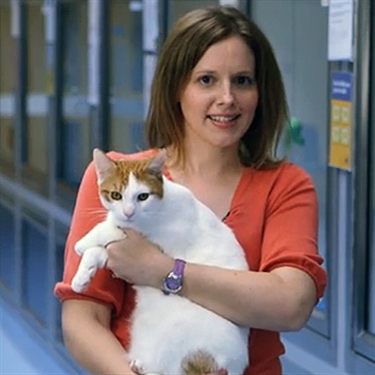Media release - Moggies remain a mystery to many, suggests survey
31 July 2013
 A new survey by leading feline welfare charity Cats Protection shows that many people are failing to understand the ‘language’ of cats, with a distinctive lack of Dr Dolittles amongst British owners.
A new survey by leading feline welfare charity Cats Protection shows that many people are failing to understand the ‘language’ of cats, with a distinctive lack of Dr Dolittles amongst British owners.
The research, which surveyed over 1,100 adult cat owners, found a worrying lack of knowledge in certain areas which has prompted the charity to launch an initiative to educate the nation about cat behaviour.
In particular, the survey revealed that:
- Two thirds (65 per cent) of us think a cat only purrs when happy whereas it sometimes can occur when it is in pain.
- The majority of people (76 per cent) failed to understand a cat’s upright tail is a greeting.
- One in 20 concludes that a cat rubs its cheeks on surfaces because it has an ‘itchy face’ rather than actually marking a territory.
"These findings show that we need to help people gain a better understanding of their cats which are sometimes misunderstood because they are complex creatures,” said Nicky Trevorrow, Cats Protection’s Behaviour Manager. “Cats are often considered to be independent and able to look after themselves whereas dogs are usually perceived to ‘need’ their owners. The reality is that while cats are pretty good at surviving without us, they do of course have needs. If these aren’t met, it can lead to stress and behavioural problems.”
The findings highlight how owners can struggle to follow signs that their cat is unhappy. More than a third (38 per cent) didn’t realise a cat with flattened ears means it is scared and needs somewhere to hide. Also worrying is 49 per cent of us are unable to identify that a cat licking its lips can be an indication of stress.
“It isn’t all bad news however,” said Nicky, “as most people (69 per cent) do understand that cats slow-blink if they are relaxed in our company and over two thirds (68 per cent) know a cat is greeting us when it is lying on its back.”
To help cat owners enjoy a more meaningful relationship with their pet, Cats Protection has posted a free education tool on its website called Understanding Feline Origins designed to help owners recognise their cats’ basic needs
www.cats.org.uk/learn/e-learning-ufo along with a video explaining different cat behaviours below.
The charity is also hosting an Ask the Behaviourist Q&A on the charity’s Facebook site at
www.facebook.com/catsprotection from 11am to 1pm on Friday 2 August to help owners solve their own moggy mysteries.
~ ends ~
For further information or an interview, please contact Cats Protection’s Media Office on
01825 741 911 or email
media.office@cats.org.uk
Notes to editors:
1. Cats Protection commissioned ICM to conduct a survey of 1,100 interviews with UK cat owners online during the 6th–10th June 2013.
2. Cats Protection is the UK’s leading feline welfare charity and helps over 218,000 unwanted cats each year through a national network of 257 volunteer-run branches and 30 adoption centres.
3. Cats Protection’s registered charity number is 203644 (England and Wales) and SC037711 (Scotland). The charity’s vision is a world where every cat is treated with kindness and an understanding of its needs.
4. Founded as the Cats Protection League in 1927, the charity adopted the name Cats Protection in 1998. We ask that you use the name Cats Protection when referring to the charity in all published material.
5. More information about the work of Cats Protection can be found at
www.cats.org.uk